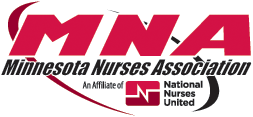(This was submitted from the husband of a MNA RN to both newspapers here in the Twin Cities but we have yet to see it published.)
A Modest Proposal for the Nurses
Wise people teach us that the best way to understand another person is to
walk a mile in his shoes.
So to resolve the issues between nurses and health care bureaucrats, let
them walk a mile in each other’s shoes. For bureaucrats these means
going out and buying uniforms and some relatively inexpensive white tennis
shoes, mostly women’s sizes. For nurses it will mean some serious
shopping and wardrobe upgrading, no more of that one uniform on my back and
one in the wash mentality.
But the shoes and uniforms are only the beginning. To really get where
somebody else is coming from, you have to do all you can to get inside
their skin. Bureaucrats are going to have to learn to live on, let’s
say, the average salary for an RN. This is going to require a major cut
back in family expenditures, even some living from paycheck to paycheck.
But they’ll learn that if they’re careful, clip those coupons, and
watch for the sales, a nurse can claim to be middle class. Maybe they’ll
even learn to thank the union that has made this possible.
And the bureaucrats will learn some of the joys of being a registered
nurse. They’ll know what it’s like to come home very tired but with
the self respect that comes from actually helping other people. True, with
their greatly reduced income they won’t be able to afford country clubs
any longer, but they’ll get free exercise being on their feet all day.
True also, they won’t be able to afford to do a lot of travel, but they
will get to meet hard working Tibetans, dedicated west Africans, gentle
Somalis, and all those new Americans who empty the trash, mop the floors,
and do their best to keep hospital rooms clean.
It’s going to be tougher for the nurses: serious shopping to buy
corporate clothes, finding the right financial advisor to invest all that
extra money, and learning how to work sitting down. But they’ll get to
meet aggressive union busting lawyers, those delightful heads of companies
that provide $1600-2200/day replacement nurses (in addition to round trip
out of state travel expenses, luxury hotel accommodations, three meals a
day, paid expenses of establishing a MN nursing license, perhaps extra pay
for remembering to actually ADMIT patients), and maybe even fly off to
learn management techniques from Toyota in Japan. Hear the one about the
suddenly accelerating pacemaker?
I’m pretty sure that the stress of all that money and the longing to get
back to really helping people would cause the nurses soon to plead to
return to the bargaining table. For the bureaucrats, it may take one more
lesson in humility. So let them go back to their offices, but under the
work rules they want to impose on our nurses.
For example, they could be “bureaucrats on call”. They’d wouldn’t
get regular shifts or be trained into a particular office. They’d be a
kind of pool of bureaucrats to be called in when there’s not safe
bureaucrat staffing. Of course, they wouldn’t know from week to week how
much they’d earn, but they’d get used to it. And speaking of “unsafe
staffing” in this new world, the nurses will decide how many bureaucrats
are needed on a particular shift of bureaucrats.
Actually this last won’t be too hard. Having too few bureaucrats at a
meeting wouldn’t be dangerous, just a little lonesome. But don’t have
enough nurses on a hospital unit and sooner or later a patient who could
have survived will die.
If my modest proposal is adopted, I believe that both sides will be eager
to resume bargaining, maybe a little wiser and a little humbler. And I
believe that the Minnesota sense of cooperation, fair play, common sense,
and passion for the common good will prevail so that a just settlement will
be reached that keeps our hospitals safe and among the best in our nation.
The Rev. Dr. Robert W. Griggs



